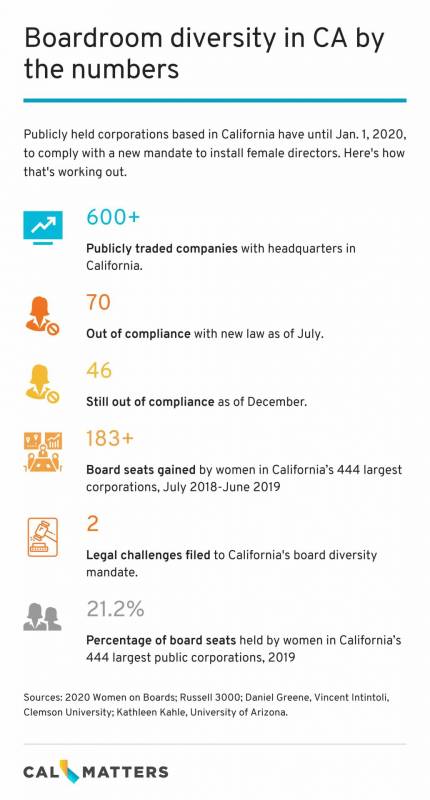Eric Nash, a spokesman for El Segundo-based Stamps.com, a provider of online postage and shipping software, said the company had no comment beyond its April announcement of entrepreneur Kate Ann May’s appointment to the board. May did not respond to a request for comment.
TiVo Corp., the San Jose-based company whose device became the generic name for digital video recorders, did not respond to emails and calls seeking comment about its appointment of two women to its board in April. Loria Yeadon, chief executive of the YMCA of Greater Seattle, declined to speak. Laura Durr, a former technology executive, could not be reached.
A study by Daniel Greene and Vincent Intintoli, Clemson University assistant finance professors, and Kathleen Kahle, a University of Arizona finance professor, showed that, as of July, 70 of the 602 publicly traded companies with headquarters in California were not in compliance with the new law. Since then, the number has dropped to 46 (about 8%), said Clemson’s Greene. The three did not name the companies.
The initial study showed that the costs of board expansion were negligible for the largest firms but substantial for the smallest. For many firms, the study showed, the cost of expanding a board to accommodate a woman could outweigh the financial penalty for failing to comply by the 2019 deadline.
Companies that continue to fail to satisfy the law face fines of $300,000 for a second or subsequent violation.
SeaSpine Holdings Corp., a medical device company based in Carlsbad that was spun off from its parent in 2015, recently named two women to its board who brought expertise in marketing and finance. But they were not the first females in the company’s boardroom. Another woman, who had been on the board since before SB 826, resigned after a work-related move to Boston.
SeaSpine President and Chief Executive Keith Valentine said he applauded the new law’s goal of moving more women into boardrooms.
“From our perspective, I think this is appropriate, progressive movement forward,” he said. “There are going to be folks who want to argue it. … We have very talented people now on our board, and we’re a better company for it.”
Kimberly Commins-Tzoumakas, a seasoned CEO and one of the two women SeaSpine appointed, said board seats have typically been filled through historical relationships. “I do not believe that every all-male board is in place for discriminatory reasons,” she said. “I do, however, commend California for taking a stand of inclusion and opening doors for equality on boards.”
CalMatters.org is a nonprofit, nonpartisan media venture explaining California policies and politics.

